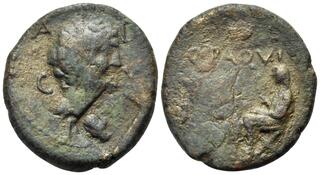| Nomos AG > obolos 31 | Auction date: 21 April 2024 |
| Lot number: 422 Price realized: 300 CHF (Approx. 329 USD / 309 EUR) Note: Prices do not include buyer's fees. | Show similar lots on CoinArchives Find similar lots in upcoming auctions on |
| Lot description: MACEDON. Philippi. The Triumvirs. Mark Antony, 42 BC. (Bronze, 22 mm, 6.51 g, 11 h), struck under the legatus coloniae deducendae, M. Paquius Rufus. A I C V P Bare head of Mark Antony to right; right hand holding a caduceus, within rectangular countermark punched against the lower right field. Rev. Q PAQVIVS RVF LEG C D Togate figure seated left on curule chair; at feet to left, urn. AMNG II 11. RPC I 1647. SNG ANS 673 (same obverse die). SNG Copenhagen 304. Very rare; struck just after the defeat of the assassins of Julius Caesar in 42 BC by the second Triumvirate. A few deposits, otherwise, about very fine. The legend on the reverse names Q. Paquius Rufus as the legate responsible for the founding of the colony of Philippi (leg[atus] c[oloniae] d[educendae]), which occurred in 42 BC. According to J. H. Hellerman, Reconstructing Honor in Roman Philippi: Carmen Christi as Cursus Pudorum (p. 74) "The responsibility for the distribution of Philippi's landed resources, which fell to Quintus Paquius Rufus, was publicly exercised in a scripted, highly traditional ritual. In preparation for the ceremony, officials known as agrimensores measured the land and partitioned it into large square parcels (centuriae). These parcels were then subdivided into smaller partitions (sortes, acceptae). Next, the colonists were separated into groups to determine the order in which they would draw lots for the available land. The colony's founder (here Rufus, as legatus coloniae deducendae) took in hand the formal record of the above proceedings and then presided over the distribution of the land; he sat on a ceremonial chair called the sella curulis with a vase containing the lots (sorticulae, pittacia) at his feet. A brief ritual enacted by the legate led immediately to the drawing of lots and the assigning of land to the colonists," most of whom would have come from the legion's rank-and-file soldiers. We are fortunate to be able to identify that the legion that was settled during the founding of Philippi was the XXVIII, as the gravestone of one Sextus Volcasius, son of Lucius, and originally from Pisa mentions. Starting price: 100 CHF |  |


